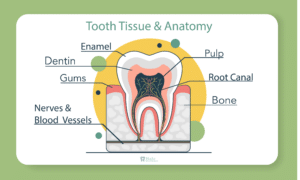What Is Diabetes?
Diabetes Mellitus is a chronic condition that occurs when one’s body is no longer able to make insulin or properly use the insulin it produces. This condition is broken up into different categories, including Type 1 Diabetes, Type 2 Diabetes, and Gestational Diabetes.
Type 1 diabetics are insulin dependent, meaning their bodies will produce little to no insulin. This type of diabetes is usually diagnosed during younger ages.
Type 2 diabetics are insulin resistant, meaning they don’t have the ability to properly regulate the insulin their body produces. This type of diabetes is more common in the adult population and can be prevented with regulation of blood glucose and a healthier lifestyle.
Gestational diabetics are diagnosed in non-diabetic pregnant persons. This condition could potentially cause complications for the pregnant individual and child, while it is often known to put pregnant individuals at risk for Type 2 diabetes.
How Does Diabetes Mellitus Affect Oral Health?
Dry Mouth
Uncontrolled diabetes decreases the flow of saliva, which ultimately results in dry mouth. This is a problem of its own, as low production of saliva means a higher risk for tooth decay.
Gum Disease
Less than optimal glucose levels, over a period of time, can triple the risk of developing gum disease. Diabetics have a reduced immune response, and because gum disease is an infection, those individuals have a weakened ability to fight off the harmful bacteria invading the oral cavity.
Fungal Infections
Diabetic individuals who frequently take antibiotics to fight off infections are more likely to develop a fungal infection in the mouth or on the tongue. This is especially common in those who wear dentures. This overgrowth of yeast can cause painful, ulcerated patches in the mouth. By keeping blood glucose levels in the target range, individuals can keep these infections to a minimum.
Increased Risk for Tooth Loss
Individuals with faulty glycemic control present with inflamed gums tissues and evidence of bone loss. When an individual has changes in their oral bacteria due to diabetes, it affects the surrounding structures of teeth. Diabetics have a higher risk of tooth loss due to gum disease.
Symptoms of Gum Disease
- Red, swollen, bleeding gum tissues
- New spaces between teeth
- Loose teeth
- Bad taste
- Foul smell from mouth after oral home care
Keep in mind, someone who has been diagnosed with Gum Disease for the first time may need a Deep Cleaning or routine Periodontal Cleanings to maintian the disease and keep plaque and tartar at bay.
Dental Considerations for Diabetics
With diabetic individuals having a reduced immune response and slower healing rate, it is important that the patient and dental team keep certain things in mind.
- Morning appointments are typically better for individuals with diabetes.
- It is also best that diabetic patients eat and take their medication prior to their appointment.
- When it comes to more elective dental treatment, it may be best to halt the appointment until the patient’s diabetes is under control. This is why it is essential to help keep the physician and dentist on the same page.
Reducing Negative Effects of Diabetes on the Oral Cavity
- Stay in touch with your physician in order to update your dentist on any changes with your diabetes or medications.
- Visit your dentist for regular cleanings and exams to keep the bacteria count to a minimum.
- Use proper at home care for your oral cavity, including brushing twice a day with fluoridated toothpaste and flossing once a day.
- Drink plenty of water and chew sugar-free gum to help stimulate saliva flow and avoid dry mouth.
- Keep blood glucose levels within the target range. Your primary care team will known this number.
- Consume a well-balanced diet to keep your body healthy, as this leads to a healthier mouth.
Diabetes doesn’t just impact blood sugar levels; it strikes at the very foundation of oral health. Strong correlations exist between diabetes and heightened risks for gum disease, tooth decay, and even tooth loss. For those with diabetes, meticulous oral care isn’t just a recommendation—it’s a crucial part of managing their overall health.


